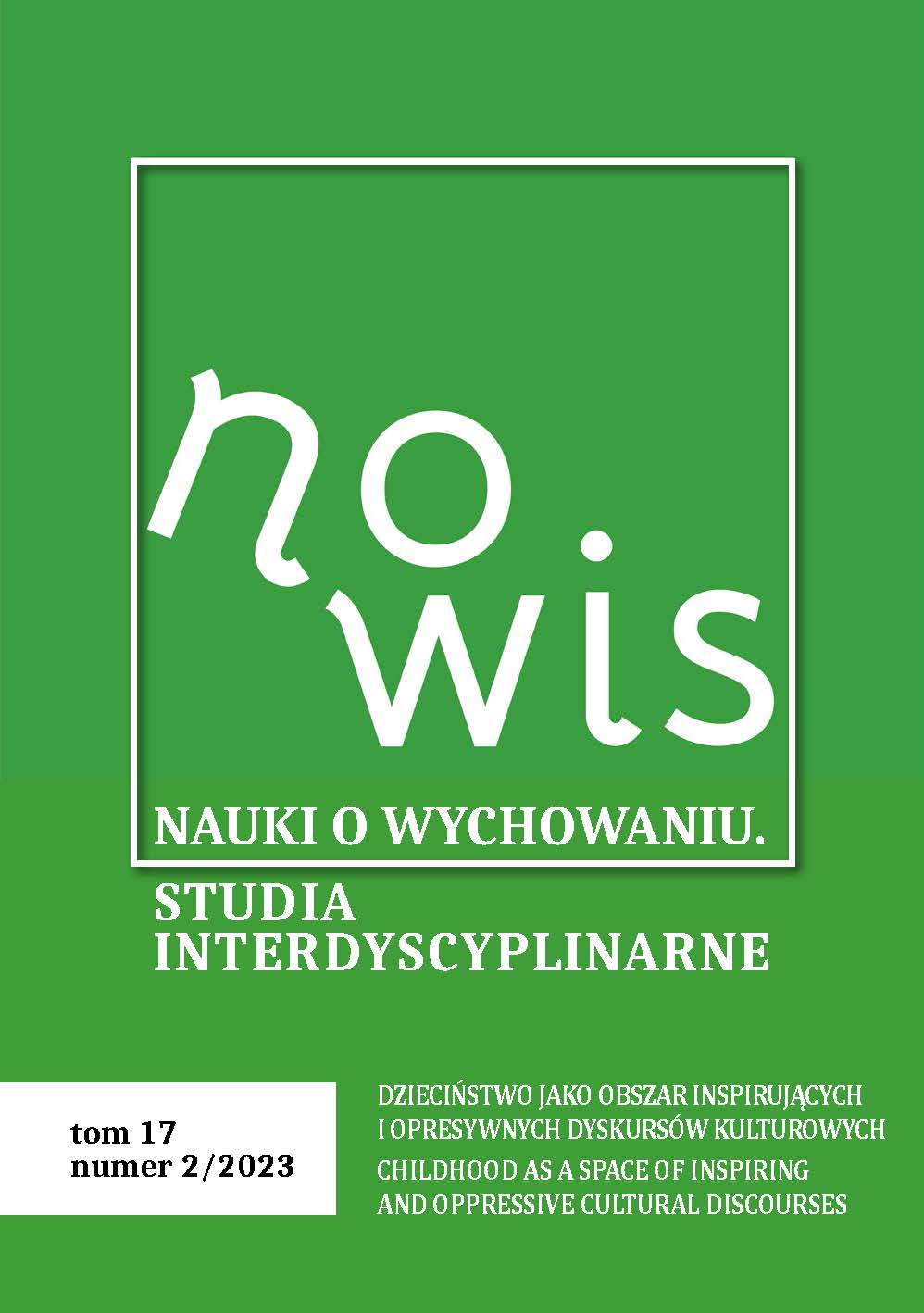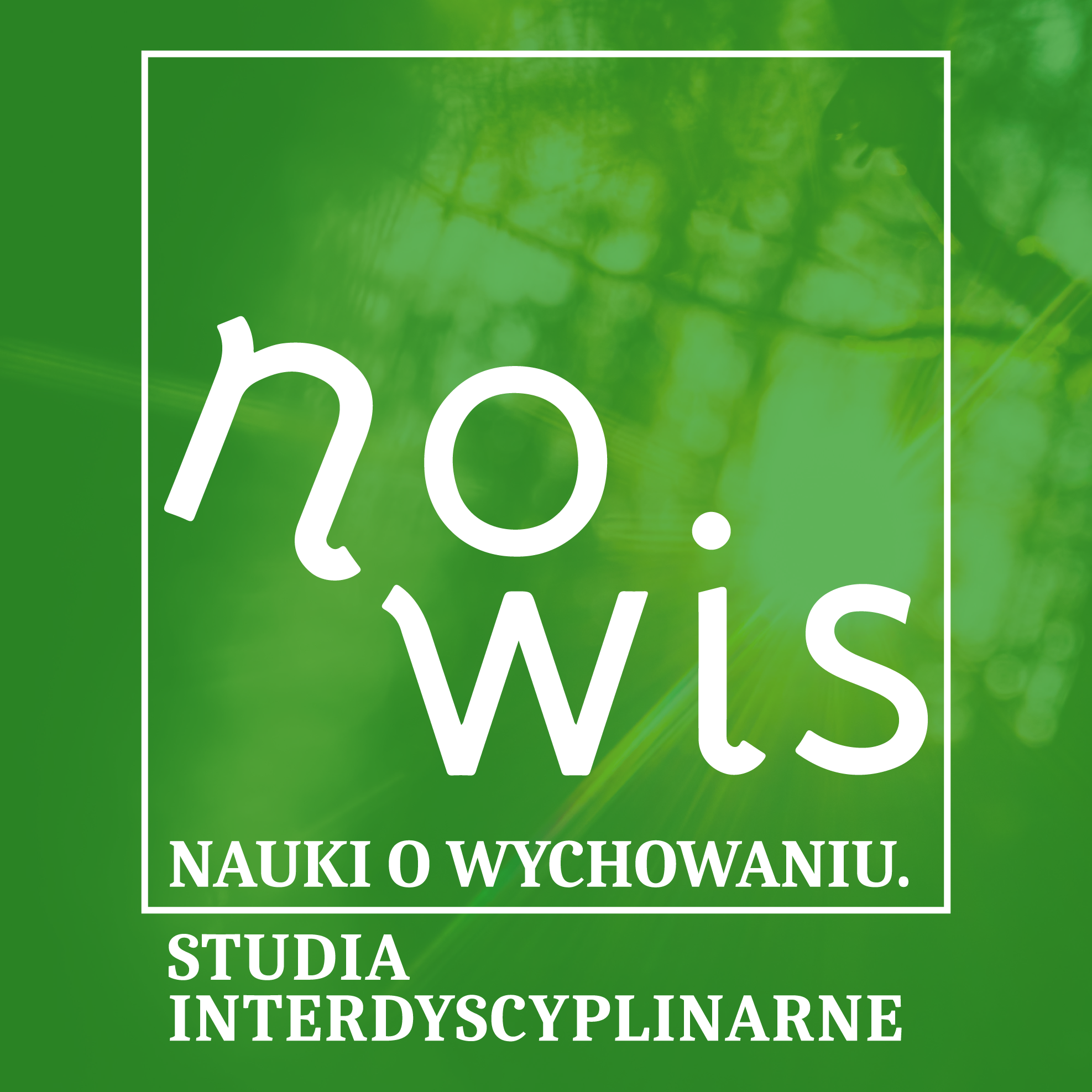Posthumanistyczna pedagogia wspólnych światów dzieci i zwierząt – od niezależności do relacyjności
DOI:
https://doi.org/10.18778/2450-4491.17.05Słowa kluczowe:
posthumanizm, wspólne światy, pedagogia wspólnych światów dzieci i zwierząt, relacyjność, dobro wspólneAbstrakt
Zamierzeniem autorki jest przedstawienie koncepcji pedagogii wspólnych światów dzieci i zwierząt, osadzonej w ramie założeń posthumanizmu. W jego świetle dziecko jawi się jako istota ściśle związana z pozaludzkimi bytami, jednostkami i siłami, egzystująca we wspólnych światach życia. Zamieszkujące te światy dzieci i zwierzęta nie są odseparowanymi od siebie bytami, lecz istotami relacyjnymi, sprawczymi, wzajemnie na siebie wpływającymi. Pedagogia wspólnych światów dzieci i zwierząt jest rozumiana jako praktyka edukacyjna, która umożliwia dzieciom utrzymywanie niehierarchicznych relacji ze zwierzętami podczas spotkań międzygatunkowych. Oferuje ona dzieciom niekonwencjonalny sposób poznawania i działania, pozwala im bowiem nie tyle na uczenie się „o” świecie, co raczej na uczenie się razem „ze” światem. Przebywanie w heterogenicznych wspólnych światach i nawiązywanie z nim pogłębionych relacji wiąże się przy tym z koniecznością zadbania o dobro wspólne. Może to zapewnić pomyślną egzystencję ludziom i bytom pozaludzkim teraz i w przyszłości.
Bibliografia
Bakke M. (2010) Posthumanizm: człowiek w świecie większym niż ludzki in: Człowiek wobec natury – humanizm wobec nauk przyrodniczych, J. Sokolski (ed.), Warszawa, Wydawnictwo Neriton, pp. 337–357.
Google Scholar
Bakke M. (2011) Studia nad zwierzętami: od aktywizmu do akademii i z powrotem?, “Teksty Drugie”, no. 3, pp. 193–204.
Google Scholar
Barad K. (2007) Meeting the Universe Halfway. Quantum Physics and the Entanglement of Matter and Meaning, Durham–London, Duke University Press, https://doi.org/10.2307/j.ctv12101zq
Google Scholar
DOI: https://doi.org/10.2307/j.ctv12101zq
Bell A. C., Russell C. L. (1999) Life Ties: Disrupting Anthropocentrism in Language Arts Education in: Teaching for a Tolerant World, J. Robertson (ed.), Urbana, IL, National Council of Teachers of English, pp. 68–89.
Google Scholar
Boileau E. Y. S., Russell C. (2018) Insect and Human Flourishing in Early Childhood Education: Learning and Crawling Together in: Research Handbook on Childhoodnature. Assemblages of Childhood and Nature Research, A. Cutter-Mackenzie, K. Malone, E. Barratt Hacking (eds.), Springer International Handbooks of Education, Cham, Springer, pp. 1–16.
Google Scholar
Bradshaw J. (2019) Zwierzęta wśród nas. Jak zwierzęta czynią nas ludźmi, trans. M. Borzobohata-Sawicka, Warszawa, Wydawnictwo Czarna Owca.
Google Scholar
Common Worlds Research Collective (2020) Learning to Become with the World: Education for Future Survival, Education Research and Foresight Working Paper 28, Paris, UNESCO.
Google Scholar
Cutter-Mackenzie-Knowles A., Malone K., Barratt Hacking E. (2020) Prologue in: Research Handbook on Childhoodnature. Assemblages of Childhood and Nature Research, A. Cutter-Mackenzie-Knowles, K. Malone, E. Barratt Hacking (eds.), Springer International Handbooks of Education, Cham, Springer, pp. xi–xvi, https://doi.org/10.1007/978-3-319-67286-1
Google Scholar
DOI: https://doi.org/10.1007/978-3-319-67286-1
Derra A. (2017) „Twórzmy dzieci, a nie relacje”. Wspólne życie na zniszczonej planecie w chthulucenie Donny Haraway, “AVANT”, no. 3, pp. 215–228.
Google Scholar
Dunn R. (2020) Nie jesteś sam w domu. Od drobnoustrojów po krocionogi, śpieszki i pszczoły miodne. Historia naturalna stworzeń, z którymi dzielimy życie, Kraków, Copernicus Center Press.
Google Scholar
Fawcett L. (2014) Kinship Imaginaries: Children’s Stories of Wild Friendships, Fear, and Freedom in: Routledge Handbook of Human–Animal Studies, G. Marvin, S. McHugh (ed.), New York, Routledge, pp. 259–274.
Google Scholar
Franczyk A., Krajewska K., Skorupa J. (2008) Animaloterpia. Program Przedszkolnego Klubu Animals „Cztery łapy”, Kraków, Oficyna Wydawnicza “Impuls”.
Google Scholar
Gilbert S. F., Sapp J., Tauber A. I. (2012) A Symbiotic View of Life: We Have Never Been Individuals, “The Quarterly Review of Biology”, no. 4, pp. 325–341, https://doi.org/10.1086/668166
Google Scholar
DOI: https://doi.org/10.1086/668166
Haraway D. (2003) The Companion Species Manifesto: Dogs, People, and Significant Otherness, Chicago, Prickly Paradigm Press.
Google Scholar
Haraway D. (2008) When species meet, Minneapolis, University of Minnesota Press.
Google Scholar
Haraway D. (2016) Staying with the Trouble. Making Kin in the Chthulucene, Durham, Duke University Press, https://doi.org/10.2307/j.ctv11cw25q
Google Scholar
DOI: https://doi.org/10.2307/j.ctv11cw25q
Johnson B. (2002) On the Spiritual Benefits of Wilderness, “International Journal of Wilderness”, no. 3, pp. 28–32.
Google Scholar
Katcher A. (2002) Animals in Therapeutic Education: Guides into the Liminal State in: Children and Nature: Psychological, Sociocultural, and Evolutionary Investigations, P. Kahn, S. Kellert (eds.), Cambridge, MA, MIT Press, pp. 179–198.
Google Scholar
Kirksey S. E., Helmreich S. (2010) The Emergence of Multispecies Ethnography, “Cultural Anthropology”, no. 4, pp. 545–576, https://doi.org/10.1111/j.1548-1360.2010.01069.x
Google Scholar
DOI: https://doi.org/10.1111/j.1548-1360.2010.01069.x
Latour B. (2004) The Politics of Nature: How to Bring the Sciences into Democracy, Cambridge, MA, Harvard University Press.
Google Scholar
Lenz-Taguchi H. (2010) Going Beyond the Theory/Practice Divide in Early Childhood Education: Introducing an Intra-Active Pedagogy, London – New York, Routledge, https://doi.org/10.4324/9780203872956
Google Scholar
DOI: https://doi.org/10.4324/9780203872956
Lindgren N., Öhman J. (2019) A Posthuman Approach to Human-Animal Relationships: Advocating Critical Pluralism, “Environmental Education Research”, no. 8, pp. 1200–1215, https://doi.org/10.1080/13504622.2018.1450848
Google Scholar
DOI: https://doi.org/10.1080/13504622.2018.1450848
Malone K., Tesar M., Arndt S. (2020) Theorising Posthuman Childhood Studies, Singapore, Springer, https://doi.org/10.1007/978-981-15-8175-5
Google Scholar
DOI: https://doi.org/10.1007/978-981-15-8175-5
Molloy Murphy A. (2018) (Re)considering Squirrel – From Object of Rescue to Multispecies Kin, “Journal of Childhood Studies”, no. 1, pp. 60–67, https://doi.org/10.18357/jcs.v43i1.18265
Google Scholar
DOI: https://doi.org/10.18357/jcs.v43i1.18265
Molloy Murphy A. (2020) No Happy Endings: Practicing Care in Troubled Times, “Journal of Childhood Studies”, no. 2, pp. 7–13, https://doi.org/10.18357/jcs452202019735
Google Scholar
DOI: https://doi.org/10.18357/jcs452202019735
Murris K. (2016) The Posthuman Child. Educational transformation through philosophy with picturebooks, London – New York, Routledge, https://doi.org/10.1007/978-981-287-532-7_164-1
Google Scholar
DOI: https://doi.org/10.1007/978-981-287-532-7_164-1
Myers G. (2007) The Significance of Children and Animals: Social Development and Our Connections to Other Species, ed. 2, West Lafayette, Purdue University Press.
Google Scholar
Nelson N., Pacini-Ketchabaw V., Nxumalo F. (2018) Rethinking Nature-Based Approaches in Early Childhood Education: Common Worlding Practices, “Journal of Childhood Studies”, no. 1, pp. 1–14, https://doi.org/10.18357/jcs.v43i1.18261
Google Scholar
DOI: https://doi.org/10.18357/jcs.v43i1.18261
Nxumalo F., Pacini-Ketchabaw V. (2017)“Staying with the Trouble” in Child-Insect-Educator Common Worlds, “Environmental Education Research”, no. 10, pp. 1414–1426, https://doi.org/10.1080/13504622.2017.1325447
Google Scholar
DOI: https://doi.org/10.1080/13504622.2017.1325447
Pacini-Ketchabaw V., Nxumalo F. (2015) Unruly Raccoons and Troubled Educators: Nature/Culture Divides in a Childcare Centre, “Environmental Humanities”, no. 7, pp. 151–168, https://doi.org/10.1215/22011919-3616380
Google Scholar
DOI: https://doi.org/10.1215/22011919-3616380
Pacini-Ketchabaw V., Taylor A. (2015) Unsettling Pedagogies Through Common World Encounters: Grappling with (Post)Colonial Legacies in Canadian Forests and Australian Bushlands in: Unsettling the Colonial Places and Spaces of Early Childhood Education, V. Pacini-Ketchabaw, A. Taylor (eds.), New York – London, Routledge, pp. 43–62, https://doi.org/10.4324/9781315771342
Google Scholar
DOI: https://doi.org/10.4324/9781315771342
Radomska M. (2010) Braidotti/Haraway – perspektywa posthumanizmu, “Nowa Krytyka”, no. 24/25, pp. 57–74.
Google Scholar
Ross S. B. (2011) The Extraordinary Spirit of Green Chimneys: Connecting Children and Animals to Create Hope, West Lafayette, Purdue University Press, https://doi.org/10.2307/j.ctt6wq2zz
Google Scholar
DOI: https://doi.org/10.2307/j.ctt6wq2zz
Rossovska O., Zimanyi L., Short L., Singh A., Beard K., Casale J., Silvestro A., Garcia W. (2020) I Speak Frog: Storying Seasonal Narratives of Children’s Common Worlds, “The Peer Reviewed Collection”, no. 1, pp. 11–20, [online:] https://assets.nationbuilder.com/aeceo/pages/2524/attachments/original/1595879343/eceLINK_Summer_2020_i_speak_frog.pdf?1595879343 (access:12.01.2023).
Google Scholar
Russell J. (2017)“Everything has to die one day”: Children’s Explorations of the Meanings of Death in Human-Animal-Nature Relationships, „Environmental Education Research”, no. 1, pp. 75–90, https://doi.org/10.1080/13504622.2016.1144175
Google Scholar
DOI: https://doi.org/10.1080/13504622.2016.1144175
Sommerville M. (2020) Posthuman Theory and Practice in Early Years Learning in: Research Handbook on Childhoodnature. Assemblages of Childhood and Nature Research, A. Cutter-Mackenzie-Knowles, K. Malone, E. Barratt Hacking (eds.), series: Springer International Handbooks of Education, Cham, Springer, pp. 103–128.
Google Scholar
Taylor A. (2013) Reconfiguring the Natures of Childhood, London, New York, Routledge, https://doi.org/10.4324/9780203582046
Google Scholar
DOI: https://doi.org/10.4324/9780203582046
Taylor A. (2017) Beyond stewardship: Common world pedagogies for the Anthropocene, “Environmental Education Research”, no. 10, pp. 1448–1461, https://doi.org/10.1080/13504622.2017.1325452
Google Scholar
DOI: https://doi.org/10.1080/13504622.2017.1325452
Taylor A., Giugni M. (2012) Common Worlds: Reconceptualising Inclusion in Early Childhood Communities, “Contemporary Issues in Early Childhood”, no. 2, pp. 108–119, https://doi.org/10.2304/ciec.2012.13.2.108
Google Scholar
DOI: https://doi.org/10.2304/ciec.2012.13.2.108
Taylor A., Pacini-Ketchabaw V. (2015) Learning with Children, Ants, and Worms in the Anthropocene: Towards a Common World Pedagogy of Multispecies Vulnerability, “Pedagogy, Culture and Society”, no. 4, pp. 507–529, https://doi.org/10.1080/14681366.2015.1039050
Google Scholar
DOI: https://doi.org/10.1080/14681366.2015.1039050
Taylor A., Pacini-Ketchabaw V. (2019) The Common Worlds of Children and Animals. Relational Ethics for Entangled Lives, London – New York, Routledge, https://doi.org/10.4324/9781315670010
Google Scholar
DOI: https://doi.org/10.4324/9781315670010
Taylor A., Zakharova T., Cullen M. (2021) Common Worlding Pedagogies: Opening Up to Learning with Worlds, “Journal of Childhood Studies”, no. 4, pp. 74–88, https://doi.org/10.18357/jcs464202120425
Google Scholar
DOI: https://doi.org/10.18357/jcs464202120425
Tsing A. (2012) Unruly Edges: Mushrooms as Companion Species, “Environmental Humanities”, no. 1, pp. 141–154, https://doi.org/10.1215/22011919-3610012
Google Scholar
DOI: https://doi.org/10.1215/22011919-3610012
Tsing A. (2015) The Mushroom at the End of the World: On the Possibility of Life in Capitalist Ruins, Princeton, NJ, Princeton University Press, https://doi.org/10.1515/9781400873548
Google Scholar
DOI: https://doi.org/10.1515/9781400873548
Wolfe C. (2013) Animal studies, dyscyplinarność i post(humanizm), tłum. K. Krasuska, “Teksty Drugie”, no. 1–2, pp. 125–153.
Google Scholar
Yazbeck S. L. (2021) Common Worlding with(in) Early Childhood Education: (Re)situating Everyday Pedagogies, University of Victoria, [online:] https://dspace.library.uvic.ca/bitstream/handle/1828/12991/Yazbeck_Sherri-Lynn_MEd_2021.pdf?sequence=1 (access: 12.01.2023).
Google Scholar
Bacelar de Castro A. (2020) Toward Common Worlds Pedagogies in Early Childhood Education: A Response to the Challenges of the Anthropocene, Electronic Thesis and Dissertation Repository, 7103, https://ir.lib.uwo.ca/etd/7103 (access: 12.01.2023).
Google Scholar






 Strona czasopisma, prowadzona przez Zespół redakcyjny NOWiS na platformie Index Copernicus:
Strona czasopisma, prowadzona przez Zespół redakcyjny NOWiS na platformie Index Copernicus: 





